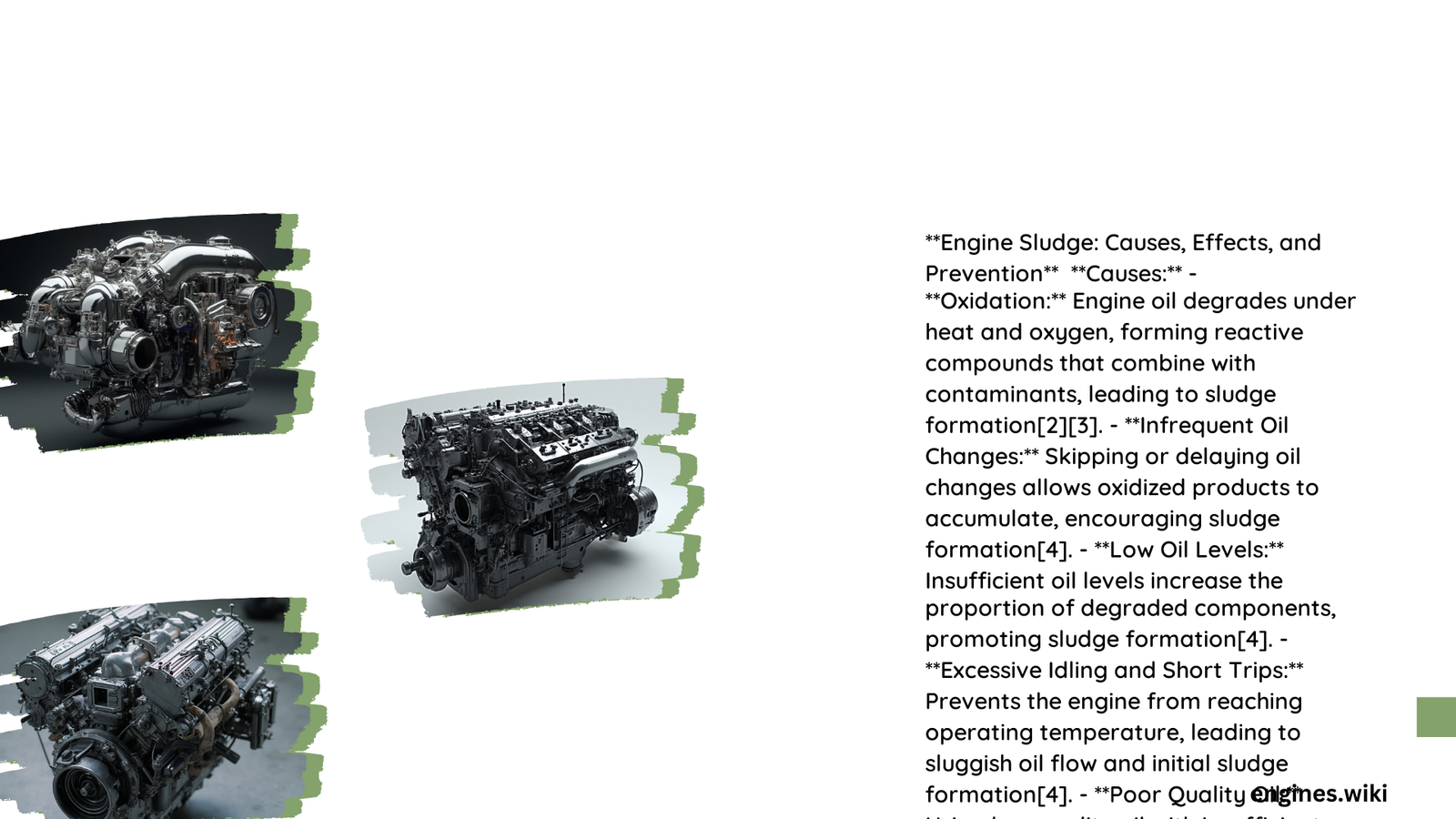A sludged up engine is a serious condition where oil breaks down and forms a thick, sticky substance that can clog vital engine components. This issue often results from neglected maintenance, poor-quality oil, or severe driving conditions. Sludge buildup can lead to decreased performance, engine damage, and potentially complete engine failure if left untreated. Understanding the causes, recognizing the symptoms, and knowing how to address this problem is crucial for maintaining your vehicle’s health and longevity.
What Causes a Sludged Up Engine?
Engine oil sludge formation is primarily caused by:
- Infrequent oil changes
- Use of low-quality oil
- Malfunctioning PCV valve
- Severe driving conditions
Let’s delve deeper into each of these factors:
1. Infrequent Oil Changes
Regular oil changes are crucial for maintaining engine health. When oil changes are neglected, the oil breaks down over time, leading to sludge formation. The recommended oil change intervals vary depending on the vehicle type and driving conditions:
- Passenger cars: Every 3,000 to 5,000 miles
- Trucks and SUVs: Every 5,000 to 7,500 miles
- High-performance cars: Every 3,000 miles
- Vehicles driven in severe conditions: As frequently as every 5,000 miles or less
2. Low-Quality Oil
Using inferior oil products can accelerate sludge formation. Low-quality oils may not have the necessary additives to prevent breakdown and sludge buildup, especially under harsh operating conditions.
3. Faulty PCV Valve
The Positive Crankcase Ventilation (PCV) valve plays a crucial role in preventing sludge formation. When this valve malfunctions, it can trap contaminants in the engine, leading to sludge buildup.
4. Severe Driving Conditions
Certain driving conditions can significantly contribute to sludge formation:
- Frequent short trips
- Stop-and-go traffic
- Extreme temperatures (hot or cold)
- Dusty or muddy environments
These conditions can produce more contaminants and accelerate oil degradation, necessitating more frequent oil changes.
What Are the Symptoms of a Sludged Up Engine?

Recognizing the symptoms of a sludged up engine is crucial for early detection and treatment. Here are the key indicators:
- Low oil pressure
- Engine overheating
- Unusual engine noises
- Decreased performance
- Check engine light illumination
Let’s examine these symptoms in detail:
1. Low Oil Pressure
Sludge can restrict oil flow, leading to low oil pressure. This can be detected through:
- Oil pressure gauge readings
- Oil pressure warning light on the dashboard
2. Engine Overheating
Sludge buildup can reduce lubrication and cooling efficiency, causing the engine to overheat. Signs include:
- Rising coolant temperature gauge
- Steam from under the hood
- Sweet, burning smell (from coolant)
3. Unusual Engine Noises
Reduced lubrication due to sludge can cause:
- Engine knocking
- Ticking sounds
- General increase in engine noise
4. Decreased Performance
A sludged up engine may exhibit:
- Reduced fuel efficiency
- Loss of power
- Sluggish acceleration
5. Check Engine Light
In some cases, a sludged up engine can trigger the check engine light due to various sensor readings being affected by the sludge buildup.
How Can a Sludged Up Engine Be Cleaned?
Cleaning a sludged up engine requires careful consideration and often professional intervention. Here are some methods:
- BG Engine Oil Quick Clean
- Synthetic oil and reduced oil change intervals
- Engine flush products
- Professional engine cleaning service
Let’s explore these methods:
1. BG Engine Oil Quick Clean
This method involves:
- Using a specialized cleaning agent
- Temporarily lowering oil change intervals
- Returning to regular intervals after cleaning
Effectiveness: Good for minimal sludge buildup
2. Synthetic Oil and Reduced Oil Change Intervals
This approach includes:
- Switching to high-quality synthetic oil
- Reducing oil change intervals temporarily
- Gradually returning to normal intervals
Effectiveness: Suitable for mild to moderate sludge buildup
3. Engine Flush Products
These products are designed to:
- Dissolve sludge and deposits
- Be added to the oil before an oil change
- Circulate through the engine to clean it
Effectiveness: Varies depending on the product and extent of sludge
4. Professional Engine Cleaning Service
This involves:
- Disassembling the engine
- Manually cleaning components
- Reassembling with new gaskets and seals
Effectiveness: Best for severe sludge buildup
| Cleaning Method | Effectiveness | Cost Range | Time Required |
|---|---|---|---|
| BG Engine Oil Quick Clean | Good for minimal sludge | $100 – $300 | 1-2 hours |
| Synthetic Oil + Reduced Intervals | Mild to moderate sludge | $50 – $100 per change | Ongoing |
| Engine Flush Products | Varies | $10 – $50 | 30 minutes – 1 hour |
| Professional Cleaning | Best for severe sludge | $500 – $2000+ | 1-3 days |
How Can Engine Sludge Be Prevented?
Preventing engine sludge is far easier and more cost-effective than treating it. Here are key preventive measures:
- Regular oil changes
- Use of high-quality oil
- PCV valve maintenance
- Addressing severe driving conditions
1. Regular Oil Changes
- Follow manufacturer-recommended intervals
- Use oil change reminder systems if available
- Keep a log of oil changes
2. Use of High-Quality Oil
- Choose oil that meets or exceeds manufacturer specifications
- Consider synthetic oil for better protection
- Ensure the correct viscosity for your engine
3. PCV Valve Maintenance
- Have the PCV valve checked during regular maintenance
- Replace if malfunctioning or as recommended by the manufacturer
- Ensure proper installation to prevent contamination
4. Addressing Severe Driving Conditions
If you frequently drive in severe conditions:
- Reduce oil change intervals
- Use synthetic oil
- Consider engine oil additives designed for severe conditions
By following these preventive measures, you can significantly reduce the risk of developing a sludged up engine and ensure the longevity and performance of your vehicle.
